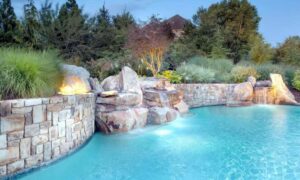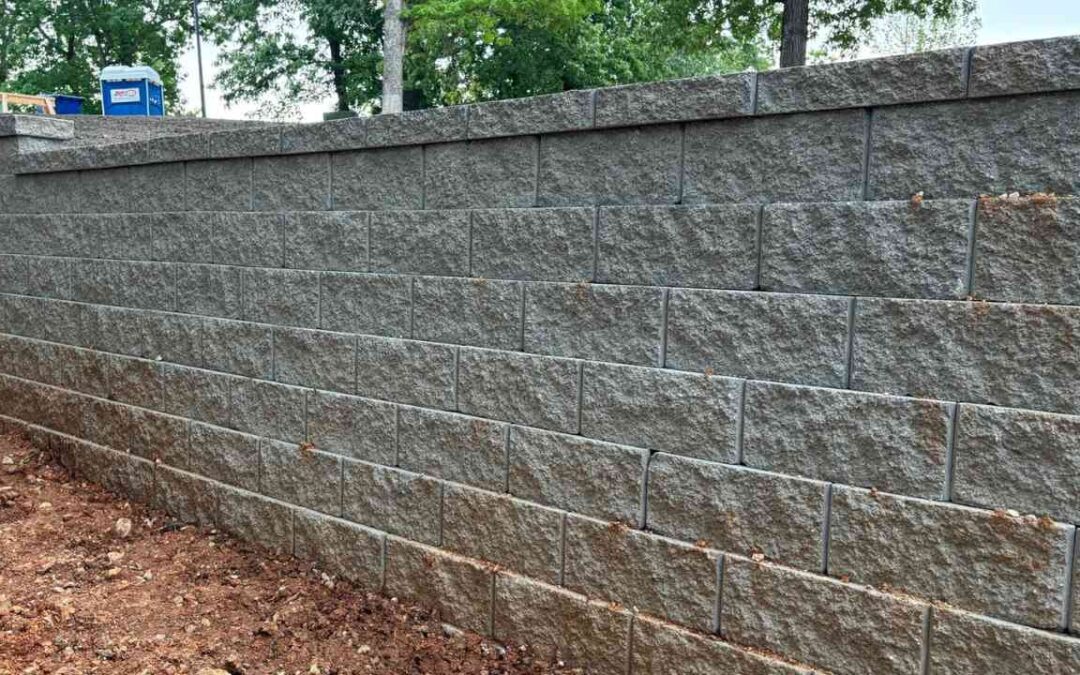Concrete and stone retaining walls are two of the most trusted options for managing elevation and soil control in residential yards throughout Missouri. In St. Louis, where the soil is expansive and highly reactive to water, selecting the right material for your retaining wall is more than just an aesthetic choice it’s a functional one. In this guide, we break down how each option holds up against local conditions, what it costs, and how to decide what’s best for your yard.
Quick Comparison Summary
- Concrete walls offer high strength, lower costs, and design flexibility
- Stone walls bring natural beauty and durability—but cost more upfront
- Missouri’s clay soil exerts strong lateral pressure, which must be accounted for
- Engineering and permitting are often required, especially over 4 feet
- Local suppliers help ensure your material works with regional conditions
Why Missouri’s Terrain Changes the Game
What makes St. Louis soil so tricky?
St. Louis sits on clay-heavy, expansive soils that swell when wet and shrink during dry periods. According to the USDA NRCS Soil Survey, these movements create intense lateral pressure behind retaining walls.
How do local conditions influence wall performance?
Walls must be engineered to resist shifting soil and water intrusion.
- 40+ inches of annual rain soaks backfill if drainage isn’t optimal
- Freeze-thaw cycles create cracks or joint failure
- Varying elevation across properties often requires tiered or reinforced builds
These are not cosmetic concerns they influence structural integrity.
Understanding Concrete Retaining Walls
What are concrete retaining walls made of?
They consist of precast concrete blocks or poured concrete systems designed for load bearing performance. Most residential builds in St. Louis use segmental retaining wall (SRW) blocks.
What are the main advantages?
- Superior strength for handling sloped yards or high walls
- More affordable than natural stone per square foot
- Custom finishes available in textures and colors
- Fast installation with predictable layout patterns
What should you watch out for?
- Susceptible to cracking if freeze-thaw cycles aren’t managed
- Shorter lifespan if inferior concrete mixes are used
- Less natural appearance, depending on the style
Evaluating Stone Retaining Walls
What defines a stone wall in Missouri builds?

Stone walls use quarried or natural rock like limestone or granite, either mortared or dry stacked.
Benefits of using stone?
- Unmatched aesthetic appeal, especially in landscape heavy yards
- High durability when installed with proper footing
- Excellent resale value due to timeless visual quality
Considerations before choosing stone:
- Cost ranges from $25–$50 per sq ft installed
- Requires skilled masons, especially for curved or tiered designs
- Difficult to adjust post installation
Side by Side Material and Cost Comparison
What does installation typically cost?
- Concrete block walls: $15–$30 per square foot
- Natural stone walls: $25–$50 per square foot (more for curved layouts)
Maintenance needs over time?
- Concrete may require re sealing or joint maintenance after 10–15 years
- Stone lasts decades with little upkeep but can be tough to repair
If budget is tight or walls are taller than 4 ft, concrete might win. If visual longevity matters most, stone shines.
When to Use Each Material in Missouri Yards
Choose concrete if you:
- Have budget limits or long walls
- Need strength on slopes or next to driveways
- Prefer a modern, structured look
Choose stone if you:
- Want a natural looking wall that complements the landscape
- Are investing in a forever home
- Don’t mind higher upfront costs for aesthetics
Do You Need Permits in Missouri?
Is engineering required in St. Louis County?
Yes. If your retaining wall exceeds 4 feet or is near public areas or homes, you’ll need:
- A stamped engineering plan by a Missouri PE
- Drainage design for water management
- City/county permit approval
Skipping these steps can lead to legal and structural headaches.
How Local Suppliers Help You Choose
Can a St. Louis supplier really make a difference?
Yes. Working with a local supplier like Retaining Wall & Paving Solutions offer custom retaining wall installations in St. Louis.
- Expertise on local soil movement and water pressure
- Material recommendations based on your slope and wall type
- Pre-bundled orders, delivery, and vetted installers
These partnerships can make or break your project’s success.
Final Thoughts: Which Material Is Right for You?
The best choice depends on your yard’s slope, your budget, and your long-term plans. Concrete is your go-to for cost, strength, and functionality. Stone wins on beauty and legacy. If you’re still weighing your options, speak to a team that knows the terrain. At Retaining Wall & Paving Solutions, we’ll walk you through what works best for your yard, your soil, and your budget.
Resources to Explore Before You Build
